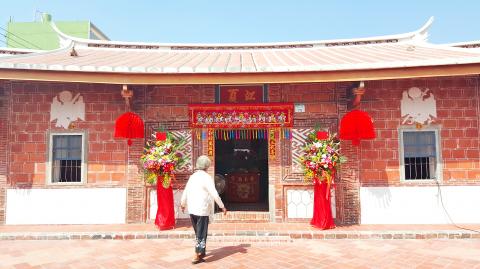Members of the Huang clan on Tuesday celebrated the completion of a decade-long project to renovate their historic estate, the Huang Clan Family Mansion (黃家古厝) in Kaohsiung’s Linyuan District (林園).
Huang Wen-nan (黃文男), president of the Association for the Maintenance of the Huang Clan’s Family Mansion, declared the historic structure open to visitors, saying that the association hopes the mansion would contribute to tourism in Kaohsiung.
About 500 people attended the ceremony as they gathered in the mansion’s rice-threshing ground, which is the second-largest such area in a traditional compound in Taiwan, and performed traditional rituals of tomb-sweeping and ancestor veneration.

Photo: Hung Chen-hung, Taipei Times
The estate, built in 1834 by a branch of the Huang clan known as “the Huangs from Jiangxia with 10,000 households,” (江夏萬戶黃) was listed as a historical site by the Ministry of Culture 10 years ago, and works to repair typhoon and termite damage began the same year.
Budget allocation for the residence’s renovation was divided among the Ministry of Culture, the Kaohsiung City Government and the clan, with the ministry shouldering 70 percent of the costs, the city government 20 percent and the Huangs 10 percent.
The clan, a large and prominent family to which many of Taiwan’s township mayors and county councilors can trace their origins, quickly raised funds by calling on its members for money the traditional method of apportioning each household in accordance to its number of adult males.
Huang Wen-ming (黃文明), eight-term village warden in Fushan (富山) in Taitung’s Beinan Township (卑南), said he brought his family to the event because he felt an urge to visit his father’s childhood home and to connect with his kin.
His recollection of the estate from his childhood is hazy, but he plans on visiting the compound regularly, he added.
Huang Chun-cheng (黃俊成), who was born in the residence, said he donated his mother’s dowry from 80 years ago — a set of antique wooden furniture — to the mansion for display.
“The building’s interior has changed, but the renovated exterior looks precisely as I remember it. It brings back memories,” Huang Chung-cheng said.
Huang Chien-chun (黃健君) said that according to his research, the clan migrated from China in 1737, the second year of Emperor Qianlong’s reign during the Qin Dynasty, and the mansion was built in the traditional layout of typical clan compounds in Zhangzhou in China’s Fujian Province.
The protrusion on the roof known as the “ridged swallowtail” indicates that at least one member of the clan had attained the prestigious rank of Jinshih (進士) in imperial examinations, Huang Chien-chun said.
The 5 hectares of the estate had remained mostly unchanged and the tomb of the fourth-generation patriarch that laid outside the estate is 300 years old, he added.
Some clan members continue to reside in Linyuan, including Huang Chao-cheng (黃兆呈) and Huang Shun-cheng (黃順成), who were respectively a former Linyuan Township mayor and a former Kaohsiung county councilor, from before Kaohsiung’s administrative upgrade.

Taiwan is stepping up plans to create self-sufficient supply chains for combat drones and increase foreign orders from the US to counter China’s numerical superiority, a defense official said on Saturday. Commenting on condition of anonymity, the official said the nation’s armed forces are in agreement with US Admiral Samuel Paparo’s assessment that Taiwan’s military must be prepared to turn the nation’s waters into a “hellscape” for the Chinese People’s Liberation Army (PLA). Paparo, the commander of the US Indo-Pacific Command, reiterated the concept during a Congressional hearing in Washington on Wednesday. He first coined the term in a security conference last

Prosecutors today declined to say who was questioned regarding alleged forgery on petitions to recall Democratic Progressive Party (DPP) legislators, after Chinese-language media earlier reported that members of the Chinese Nationalist Party (KMT) Youth League were brought in for questioning. The Ministry of Justice Investigation Bureau confirmed that two people had been questioned, but did not disclose any further information about the ongoing investigation. KMT Youth League members Lee Hsiao-liang (李孝亮) and Liu Szu-yin (劉思吟) — who are leading the effort to recall DPP caucus chief executive Rosalia Wu (吳思瑤) and Legislator Wu Pei-yi (吳沛憶) — both posted on Facebook saying: “I

Sung Chien-liang (宋建樑), who led efforts to recall Democratic Progressive Party (DPP) Legislator Lee Kun-cheng (李坤城), was released on bail of NT$80,000 today amid outcry over his decision to wear a Nazi armband to questioning the night before. Sung arrived at the New Taipei District Prosecutors’ Office for questioning in a recall petition forgery case last night wearing a red armband bearing a swastika, carrying a copy of Adolf Hitler’s Mein Kampf and giving a Nazi salute. Sung left the building at 1:15am without the armband and covering the book with his coat. Lee said today that this is a serious

A mountain blaze that broke out yesterday morning in Yangmingshan National Park was put out after five hours, following multi agency efforts involving dozens of fire trucks and helicopter water drops. The fire might have been sparked by an air quality sensor operated by the National Center for High-Performance Computing, one of the national-level laboratories under the National Applied Research Laboratories, Yangmingshan National Park Headquarters said. The Taipei City Fire Department said the fire, which broke out at about 11am yesterday near the mountainous Xiaoyoukeng (小油坑) Recreation Area was extinguished at 4:32pm. It had initially dispatched 72 personnel in four command vehicles, 16